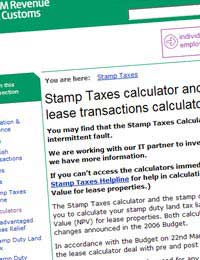Stamp Duty on Shares

Many inexperienced investors looking for a way to minimise their tax liabilities look to share trading as a way of generating tax-free income. There are two kinds of Stamp Duty which might be payable on share transactions, each of which is applicable in different circumstances.
Stamp Duty Reserve Tax
The first of these duties, Stamp Duty Reserve Tax (SDRT), is becoming more frequently levied as a result of the increasing proportion of trading which takes place through online brokerages. Similarly, many ’real world’ brokers use the CREST system, which also results in a paperless transaction. Currently, SDRT is set at a flat rate of 0.5%.However, the amount that you pay is not relative to the value of the shares but is calculated as a proportion of what you paid for them. For example, if you paid someone £100 for some shares, you would be required to pay 50p in SDRT, even if the shares were actually worth £500. It should also be noted that you will be required to pay SDRT if you exchange goods or property for shares. In these cases, the amount payable will be calculated as 0.5% of the value of whatever you have exchanged.
As well as simple share transactions, SDRT is levied on the stock options or share interests. If you are buying units in a unit trust, SDRT will also apply, but this will be paid by the trust company and so will probably be factored into the price that you pay.
Stamp Duty
For transactions which use a stock transfer form, stamp duty will be levied. This is applicable in fewer cases than in the past, again as a result of the increase in online trading, but it is still an important factor to understand. Stamp Duty is, in fact, very similar to SDRT; it is payable at the same rate (0.5%), but any payments must be rounded to the next highest £5. For example, if you were buying the same £100 worth of shares as in the previous example, your tax bill would be £5 rather than 50p.There are a few incidental factors which apply to both Stamp Duty and SDRT. As both are calculated with regard to the actual price paid for the shares, if you are given the shares for nothing then you will be required to pay no tax. Paying your tax bill on shares is very simple. Indeed, if you use the CREST system for trading (which is the case for the majority of transactions), your SDRT will be deducted and sent to HM Revenues & Customs (HMRC) without the need for any further action on your part. If you don’t use CREST, however, you will need to pay the duties to HMRC yourself. This can be done on the HMRC website, where you will also find a simple Stamp Duty calculator.


Re: Claiming Tax Relief on Mileage
Hi all, advice please. I have started work on PAYE recently in addition to my self employment. As part of my PAYE employment I…
Re: What Does Road Tax Pay For?
You need to positively explain to me how this benefits me in respect of this bill. Your website does not and of course the roads…
Re: What Does Road Tax Pay For?
What do motorists actually get from paying the "road tax" fee? I am fed up with beaueacratric measures, where councellors sit on…
Re: Should I be Paid Mileage Allowance?
Actually, I somewhat disagree with the guidance being provided in this instance. Perhaps when considering ONLY…
Re: Paying for Training Can I Claim Tax Allowance?
I am sending my son privately to have a 'Educational Psychology Assessment' because of timing concerns. Can…
Re: Payment of Pensions
How do I change my state pension from 4 weekly to weekly
Re: How Will My Second Job Be Taxed?
I have 2 jobs cleaner at club on a morning on which I don't pay tax but I work at factory on backshift as cleaner and I get…
Re: How Will My Second Job Be Taxed?
I have a main job salaried at 18,500 per year and a second job at £6.50 per hour working around 30/40 hours per week. How…
Re: What Is A Close Company And How Does It Work?
I am a director in a close company through my leasehold purchase of a flat in a Victorian house, their are 5…
Re: How Will My Second Job Be Taxed?
I will be starting a 24 hr a week job. Plus2nd job at 8 hrs a wk . How much taxwill i pay. Basic rate pay